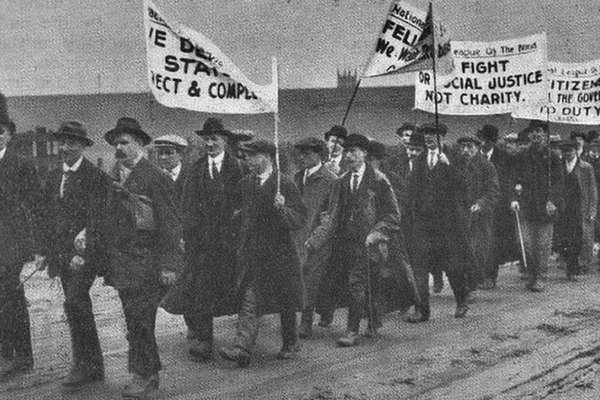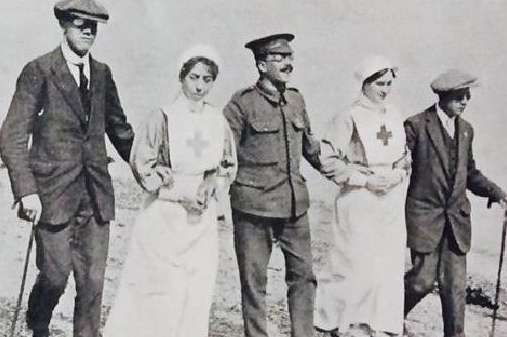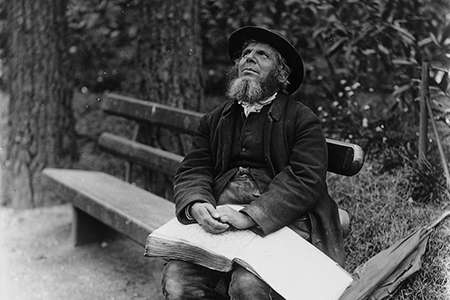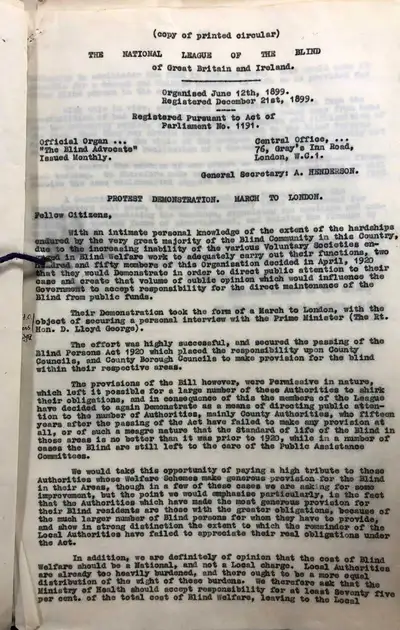Record revealed
Printed circular produced by the National League of the Blind
In 1920, hundreds of members of the National League of the Blind (NLB) marched 200 miles to campaign for government support. What were their aims and achievements? This printed circular explains.
Images
Image 1 of 2

The circular's front page
Partial transcript
PROTEST DEMONSTRATION. MARCH TO LONDON.
Fellow Citizens,
With an intimate personal knowledge of the extent of the hardships endured by the very great majority of the Blind Community in this Country, due to the increasing inability of the various Voluntary Societies engaged in Blind Welfare work to adequately carry out their functions, two hundred and fifty members of the Organisation decided in April, 1920 that they would Demonstrate in order to direct public attention to their case and create that volume of public opinion which would influence the Government to accept responsibility for the direct maintenance of the Blind from public funds.
Their Demonstration took the form of a March to London, with the object of securing a personal interview with the Prime Minister (The Rt. Hon. D. Lloyd George).
The effort was highly successful, and secured the passing of the Blind Persons Act 1920 which placed the responsibility upon County Councils, and Country Borough Councils to make provision for the blind within their respective areas.
The provisions of the Bill however, were Permissive in nature, which left it possible for a large number of these Authorities to shirk their obligations, and in consequence of this the members of the League have decided to again Demonstrate …
Image 2 of 2

The circular's back page
Partial transcript
…
With this in view, our members have decided to again face the possibilities of bad weather, the inconvenience of being away from home for the necessary period, and the increasing dangers and difficulties of the road, that they may obtain such an Amendment to the Blind Persons Act, as will give to the whole of the members of the Blind community not only the hope, but the realisation of a decent and secure future.
To ensure the success of our effort we need your moral and financial backing. We therefore make our Appeal to you, assured that we will receive the same wholehearted support which you gave us in April 1920.
A Committee will be set up in each town through which the Demonstrators will pass, to make the necessary local arrangement for feeding and accommodating the Marchers, organising the meetings and conducting the various forms of advertisement, and raising the finance to cover the cost.
May we ask for your personal support, either by working with the Committee in your Area or by sending a Donation to the funds of the March to London 1936 Demonstration direct to Central Office addressed to
The General Secretary,
National League of the Blind,
76, Gray’s Inn Road, London, W.C.1.
Why this record matters
- Date
- 1936
- Catalogue reference
- HO 45/16545
This letter circulated by the NLB provides a valuable summary of the 1920 Blind March. It stated that the marchers aimed to 'create that volume of public opinion which would influence the Government to accept responsibility for the direct maintenance of the Blind from public funds.’ They also hoped to secure a personal interview with the Prime Minister, David Lloyd George.
The march played an important role in securing changes to the law. Discussing the outcome, the NLB declared that ‘the effort was highly successful, and secured the passing of the Blind Persons Act 1920 which placed the responsibility upon County Councils, and County Borough Councils to make provision for the blind within their respective areas.’
The 1920 Blind Persons Act was the world’s first disability-specific legislation. However, it must be acknowledged that the act was disappointing for some who believed it did not provide enough support. As outlined in the record, a subsequent blind march was also held in 1936 which aimed to reframe the government’s policy on state support for the blind.
Blogs and podcasts
-
Blog
‘Obtaining state aid for the blind’: The 1920 Blind March

Drawing on records held at The National Archives, this blog tells the story of the 1920 Blind March and the subsequent passing of the 1920 Blind Persons Act.
-
Blog
St Dunstan’s Hostel for Blind Soldiers and Sailors

There are many reasons soldiers, and indeed civilians, lost their sight during the First World War. This blog examines vision loss and convalescence homes during and after the conflict.
-
Podcast
Blindness in Victorian Britain

This podcast traces how blind and visually-impaired people in the Victorian era became increasingly vocal in seeking control and ownership over the social and political issues that affected them.
